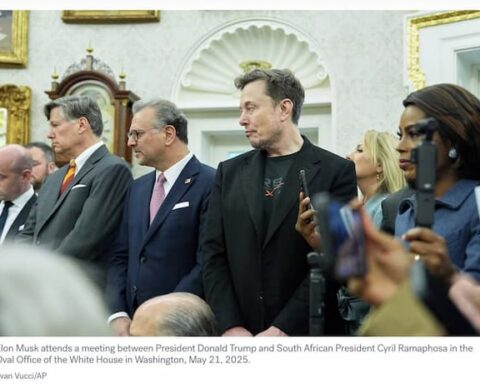So it looks like US military intervention in Venezuela might be on the cards.
Certainly, with Washington and other Western governments now officially recognising someone other than the sitting president as the legitimate leader, it’s hard to see how there won’t have to be some kind of forced conflict to finalise that arrangement: if it isn’t US military intervention, it would have to be some kind of military coup within Venezuela.
Either way, it’s been telegraphed way in advance. President Trump said a year and a half ago. “We have many options for Venezuela, including a possible military option, if necessary,” Trump told reporters at his New Jersey golf club.
He went on to say, “We have many options for Venezuela and by the way, we’re all over the world and we have troops all over the world in places that are very, very far away. Venezuela is not very far away and the people are suffering and dying. We have many options for Venezuela including a possible military option if necessary.”
It looks like they’re now moving towards probably putting that into action.
What’s remarkable is the brazeness of Western governments – foremost Washington – in simply declaring Maduro ‘has to go’ and then casually recognising an opposition figure (National Assembly speaker, Juan Guaido) as Venezuela’s ‘legitimate’ leader now. But we’ve seen this plenty, of course. I drew the parallels to Libya in this previous post on the Venezuela situation: where Britain and France simply ‘decided’ a completely new bunch of people (the ‘National Transitional Council’) were now the ‘recognised’ leaders of Libya (months before Gaddafi was hunted down and killed in Sirte).
Certainly, the situation in Venezuela is really bad.
Though, in truth, the reasons for that are more complex than simply the meme of the Brutal Dictator Imposing Evil Socialism on his unwilling people: really, would the international media be so focused on these events if Venezuela wasn’t a resource-rich, oil-rich country?
The same question, of course, had to be asked about Libya too – a country with which Venezuela was closely allied until the ‘Arab Spring’ ‘revolution’ in 2011 (in fact, Gaddafi and Chavez had jointly proposed something called ‘SATO’ – which was, in theory, a NATO for developing nations in the south to mutually defend each other from foreign imperialist actions).

As much as there has been a longstanding struggle between Venezuela’s governments and the US, it’s also important to look at broader geo-political developments in the region.
Recent history in Latin America is relevant: such as the impeachment of Dilma Rousseff in Brazil (on ‘corruption’ charges) and her replacement first by Washington-aligned elite/corporate stand-in Michel Temmer and now by elite/military ‘Populist’ Jair Bolsonaro (see here). Or the US State Department’s legitimisation of a right-wing military coup in Honduras (in 2009: see here), forcing the elected president to flee the country.
The impeachment effort against Rousseff had been mostly orchestrated by the political, media, military and economic elites in Brazil; though corporate media in Brazil and foreign media in the West had largely portrayed it as more of a populist movement of the Brazilian people.
Which forces one to be wary of the seemingly uniformly angelic descriptions of ‘popular opposition’ in Venezuela.
But all of this seems to occur against a conspicuous backdrop of multiple long-term Left-wing governments in Latin-America being replaced by right-wing governments in dubious circumstances.
I’ve covered Brazil and Honduras before, so let’s look at Argentina instead, which recently replaced a longstanding Left-wing government with a right-wing government and essentially ceded its sovereignty to Wall Street, despite years and years of staunch resistance to Washington. Dr. Paul Craig Roberts linked Rousseff’s impeachment in Brazil firmly with the removal of Cristina Fernandez de Kirchner in Argentina.
He characterised that state of affairs in this way: ‘Having removed the reformist President of Argentina, Cristina Fernandez de Kirchner, Washington is now disposing of the reformist President of Brazil, Dilma Rousseff… Washington used a federal judge to order Argentina to sacrifice its debt restructuring program in order to pay US vulture funds the full value of defaulted Argentine bonds that the vulture funds had bought for a few pennies on the dollar. President Kirchner resisted and, thus, she had to go. Washington concocted a story that Kirchner covered up an alleged Iranian bombing in Buenos Aires in 1994. This implausible fantasy, for which there is no evidence of Iranian involvement, was fed to one of Washington’s agents in the state prosecutor’s office, and a dubious event of 22 years ago was used to clear Cristina Kirchner out of the way of the American looting of Argentina…’
So, just in the last few years, that’s Honduras, Argentina and Brazil, with Venezuela having always been openly on the cards the whole time: there was already a US-backed coup attempt in 2002.
In 2002 the Bush administration was caught red-handed in a plot with the wealthy and upper middle classes of Venezuela to overthrow Hugo Chavez in a coup.
Chavez was kidnapped, held at an American military facility and Washington decided to immediately legitimise the coup. Again, I recommend reading Wall of Controversy’s excellent post on this subject here.
As he reminds us, a 2003 documentary entitled The Revolution Will Not Be Televised provides insight into the American-orchestrated coup of 2002. What was fascinating in that instance was the the Irish filmmakers had been in Venezuela to make a documentary on Chavez – only to find themselves caught up in the turmoil of the coup attempt.
As Wall of Controversy also points out, CIA head Mike Pompeo seems to have admitted in an interview that the US is engaged in an ongoing regime-change programme in Venezuela.
What of the ‘opposition’? Does it have mass support? Possibly – again, hard to tell, given all of the manipulation of perception. And even if it does have popular support, what is really guiding it at the top of the hierarchy?
Could it be the same elite interests that were behind the fall of Rouseff in Brazil or the fall of Kirchner in Argentina?
Erik Draitser’s 2016 piece on Counterpunch is particularly interesting in this regard: ‘This opposition, now in the majority in the National Assembly, uses the sacrosanct terminology of “freedom,” “democracy,” and “human rights” to conceal the inescapable fact that it has committed, and continues to commit, grave crimes against the people of Venezuela in the service of its iniquitous agenda, shaped and guided, as always, by its patrons in the United States… This so-called opposition – little more than the political manifestation of the former ruling elites of Venezuela...’
I don’t have any sense of whether Nicolas Maduro is or isn’t the brutal tyrant he is being painted as: or whether the country’s Socialist model is a catastrophic failure (or whether it even is ‘Socialism’: some in Venezuela seem to dismiss the government as fake non-Socialist).
It appears to be a catastrophic failure, but it is also fairly well established that much of the reason for this has been due to external manipulations.
Were previous elections rigged? Maybe. It’s really hard to tell what’s true and what isn’t in this information war age. Is Maduro deeply unpopular? It appears to be so. It’s probably likely that a very large number of people are against Maduro: some of them probably out of idealogical opposition or out of a basic dislike of Maduro’s actions, but most of them probably because of the dire economic situation Venezuela is in.
In other words, it isn’t necessarily the case that so many people would be rallying against the government if the economic and social conditions weren’t so bad: which then prompts us to ask the question of why the economic and social conditions are so bad.
Certainly, there’s no doubt that the situation in Venezuela is dire.
It’s not just the empty shelves in the supermarkets. The minimum wage has gone down from $350 a month to $7 – I’ve seen someone say the daily minimum wage can just about buy most people two eggs a day. Add to that the state’s documented suppression of protesters and activists (and probable manipulation of election processes), and it’s no surprise that a lot of Venezuelans want Maduro gone.
And, perhaps, the situation now has become so dire that this is really the only thing that can happen.
Maduro probably does have to go: simply because, regardless of whether much of this hardship has been manufactured externally to create an untenable situation, too many Venezuelans will always associate this period of deprivation and hardship with Maduro.
So it’s difficult to see how he could hold on for much longer. And if the elites really are behind the whole crisis in Venezuela, then – as usual – they’ll get their end-result.
As the Counterpunch piece also noted in 2016: ‘…economist and former Venezuelan ambassador to the United Nations Julio Escalona explained in Caracas on the eve of the December 2015 elections which ushered back into the National Assembly the right wing: ‘The majority of Venezuela’s imports and distribution networks are in the hands of the elite… Many of the goods needed for Venezuelan consumption are diverted to Brazil and Colombia. We are experiencing manufactured scarcity, a crisis deliberately induced as a means of destabilization against the government…’
In tracking US imperialism in Latin America in the last century, Eric Draitser notes of the Nixon administration’s (led by Henry Kissinger) 1973 overthrow of the Socialist President of Chile that ‘In declassified CIA documents, it has been revealed that President Nixon famously ordered US intelligence to “make [Chile’s] economy scream,” a reference to the need to undermine and destabilize the Chilean economy using both US financial weapons, and a powerful business elite inside Chile, in order to pave the way for either the collapse of the government or a coup d’etat...’
That’s clearly then the model that has been employed in Venezuela, all designed to bring Venezuelans to this state of affairs.
And it’s generally the model anyway: the invasion of Iraq didn’t happen until over a decade of crippling sanctions had created a severely weakened state with a suffering population.
The intervention against Gaddafi in Libya had been on the cards since at least the mid-80s, but didn’t happen until Libya had endured almost two decades of crippling sanctions, all of which served to make it seem like Gaddafi’s Libyan model had ‘failed’.
Whatever ends up happening next in Venezuela, it’s clear that the entire story has been one of long-term manipulation, external interference and even ‘manufactured scarcity’: and that the interests that will probably win in the end are the same interests that invariably always win in the end.
Read more: ‘Brazil: From Rouseff to Bolsonaro – How the Old Elites Win‘, ‘Honduras, the Military Coup & the Truth About the Migrant Caravan‘, ‘The Environmentalist & the US-Backed Death Squads‘, ‘Libya After Gaddafi: The Horror & Humiliation of the Failed State‘…





Excellent overview with fresh insights especially into events in Argentina. There is one point I would take issue with, however, and that is the question of whether Venezuelan elections have been rigged.
A system devised to eliminate fraud, Venezuelan election involve a combination of electronic and paper ballots where the one provides an audit for the other. I gather it is an exceptionally difficult system to rig and that during earlier elections monitored and validated by western observers including teams from the [Jimmy] Carter Center, there was never any suspicion of fraud. Regarding last year’s elections, of the hundreds of international observers who attended, a number afterwards wrote to Federica Mogherini to dispute the EU’s official stance. They wrote:
“We noted, in particular, not only the sophistication of the voting system which, in our collective view, is fraud-proof, but also that every stage, from the vote itself to the collation of returns, their verification and electronic submission, was conducted in the presence of representatives of the contending parties. As for “reporting irregularities”, we would be interested to hear of examples, since the reporting system is exceptionally rigorous and tamper-free. We doubt you have any evidence to back up the EU’s claim of “numerous reporting irregularities”.
“We were unanimous in concluding that the elections were conducted fairly, that the election conditions were not biased, that genuine irregularities were exceptionally few and of a very minor nature. There was no vote buying because there is no way that a vote CAN be bought. The procedure itself precludes any possibility of anyone knowing how a voter cast her or his vote; and it is impossible – as we verified – for an individual to vote more than once or for anyone to vote on behalf of someone else.”
You can read the letter in full here: https://venezuelanalysis.com/analysis/13899
Thanks very much for the citation and links which are always appreciated.
Thanks, WoC: ok, I stand corrected on the voting then. I guess I’m just saying it’s difficult to know who’s telling the truth or not sometimes.
We heard this line before when it was “Assad that has to go”. The US truly needs to stop this kind of activity. Punitive economic sanctions rarely achieve regime change, but they do cause untold suffering for the citizens of the nations targeted. It may be that as France coveted Libyan oil and gas, US oil companies are now coveting Venezuelan oil reserves.
Let us not overlook that when Trump brought back John Bolton, it likely was a sign of things to come.
As to dim witted Dilma Rouseff in Brasil, she (the former Marxist guerilla) ran the Brasilian economy into the ground. By all economic metrics, her policies were failures. I say this as someone who followed the Brasilian economy for several years.
An interesting and provocative commentary on yet another sickening example of how my country (America) and global corporate interests continue to meddle in and influence the internal affairs of so many nations throughout the world. Ultimately, the countries’ political and economic situations are plunged into chaos, leaving their citizens poorer and suffering, while corporations and stock holders get richer.